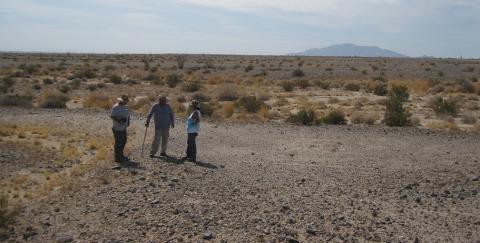Office of Native American Affairs
The Office of Native American Affairs (ONAA), established in 1998, oversees the Advisory Council on Historic Preservation’s (ACHP’s) Native American initiatives. ONAA staff also works closely with the ACHP’s tribal/Native Hawaiian member to address critical issues brought to the ACHP by Indian tribes, Native Hawaiian organizations (NHOs), and intertribal organizations.
Subjects of ONAA's current focus are:
____________________________________________________________________________________________________
Training and Guidance
In order to facilitate consultation with Indian tribes and NHOs, ONAA staff regularly develops guidance materials to assist Indian tribes, Native Hawaiian organizations, federal agencies, and other Section 106 participants. Follow the link Training and Guidance for the ACHP's training and guidance for Indian tribes, Native Hawaiian organizations, and federal agencies.
ACHP Native American Policies
In 1992, the National Historic Preservation Act was amended to include and clarify the roles and responsibilities of Indian tribes and Native Hawaiian organizations. Responding to the NHPA amendments, the ACHP began a six-year process of revising its regulations and adopted policy statements regarding Indian tribes and Native Hawaiian organizations. Follow the link ACHP Native American Policies to see or download the Native American policies.
Government-to-Government
The ACHP, as a federal agency, recognizes the government-to-government relationship between the United States and federally recognized Indian tribes and acknowledges Indian tribes as sovereign nations with inherent powers of self-governance. Follow the link Government-to-Government Consultation with Indian Tribes to see the ACHP's documents on the government-to-government relationship.
Native Hawaiian Working Group
Improving consultations on unique issues involving Native Hawaiian organizations is the purpose of the interagency working group established by the Department of the Interior (DOI), Department of Defense (DOD), and the ACHP. Follow the link for for information on the Native Hawaiian Working Group.
Native American Information Papers
The ACHP’s Office of Native American Affairs staff supports the ACHP in a number of ways, from policy development and project review, training and education, and guidance development to providing information papers about various topics concerning Indian tribes and Native Hawaiian organizations. Information papers are different than guidance documents and discuss issues that may inform participants in the Section 106 process.
Other Native American Resources
Follow Other Native American Resources for links to inter-tribal organizations and other federal agency American Indian or Native Hawaiian programs.
Native American Heritage Month
November is Native American Heritage Month. Join with the ACHP in celebrating the history of Native Americans through their vitality, strength, endurance, and their commitments to the nation. "The ACHP fully supports the participation of Indian tribes in the national historic preservation program and acknowledges their significant contributions to our understanding and protection of our nation’s heritage resources." Leonard Forsman, ACHP Vice Chairman and Chairman of the Suquamish Indian Tribe.
____________________________________________________________________________________________________
Online Tool Assists with Involving Indian Tribes Early in Section 106 Historic Preservation Process
A new source of information to aid in the process is the Tribal Directory Assistance Tool (TDAT), developed and administered by the Department of Housing and Urban Development’s Office of Environment and Energy (HUD). This web-based tribal contact database contains information about the geographic areas of current and ancestral interest to federally recognized Indian tribes.
Note: Federal agencies should not rely solely on TDAT to identify Indian tribes that should be invited to consult in the Section 106 process and also should consider other sources of information regarding areas of tribal interest.
HUD’S Tribal Directory Assistance Tool (TDAT) Information Paper: Effective Section 106 consultation with Indian tribes starts with sound research into which Indian tribes have an interest in the project area.
HUD's Newly Updated Online Tool (TDAT) Article: A new source of information to aid in the process is the Tribal Directory Assistance Tool (TDAT), developed and administered by the Department of Housing and Urban Development’s Office of Environment and Energy (HUD).
____________________________________________________________________________________________________
Authorities
National Historic Preservation Act
36 CFR PART 800 -- Protection of Historic Properties
____________________________________________________________________________________________________








